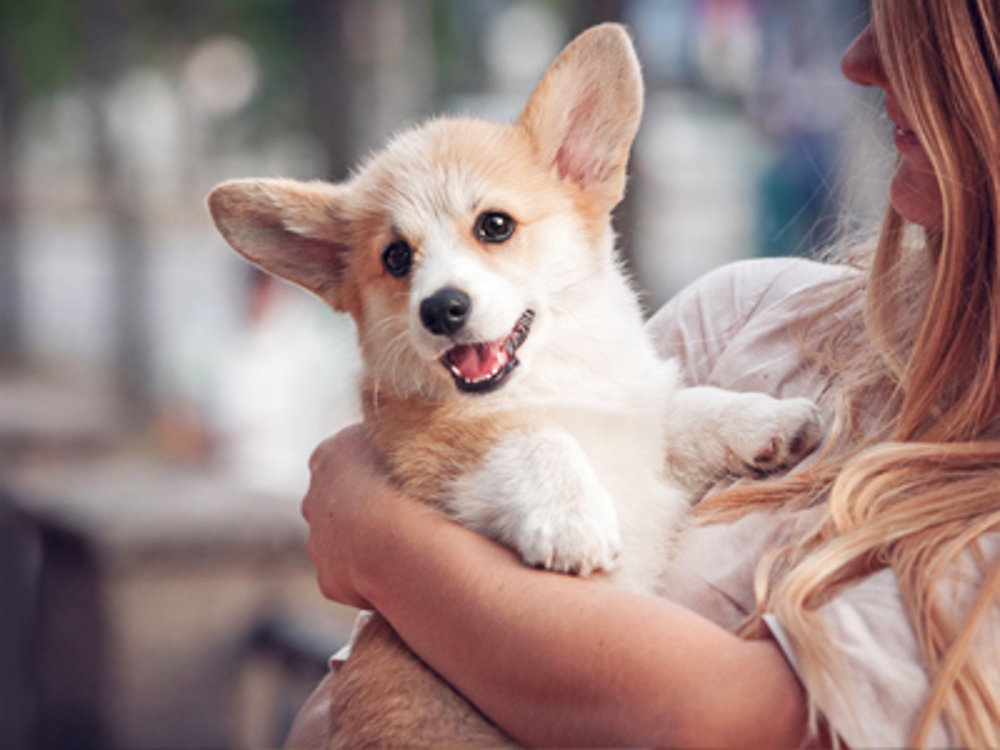
Collecting your new, four-legged companion is an exciting moment, one that you will never forget. Make sure you are well prepared when going to pick up your puppy, so you both have a relaxed journey home.
Collecting your new puppy from the breeder
When taking your puppy home, remember to take:
- a comfortable dog carrier
- a cosy blanket
- water and food for longer journeys
Your new puppy will probably be nervous being taken away from their litter and environment for the first time. Here are some tips to help them relax:
- Try to keep them in a quiet environment
- Settle your puppy in a carrier
- If the puppy is nervous, don't let children or adults handle the puppy too much
- Make sure they have enough space and fresh air
- If the puppy shows signs of distress, sit quietly and comfort them
- Make sure you give your puppy comfort breaks and take spare bedding - puppies are inclined to wee when nervous or excited
Don't forget!
- You will need a lot of equipment for your new puppy. Read our checklist of essential equipment for your puppy or dog
- It's now mandatory across the UK for all dog owners to ensure their dogs are microchipped and recorded with a government-compliant microchip database such as Petlog. If the worst happens and your dog ever goes missing, their microchip will only help reunite you if your contact details are up to date. Learn more about microchipping.
Welcoming your puppy into their new home
This first settling-in week is a very exciting time for all the family! During this time you are beginning to teach your puppy who their new family is and they are learning to trust you and bond with you.
The first few weeks
Make a list of all the things that you think are likely to be part of your dog’s life – everything you can think of that you want your puppy to accept as a normal part of their routine.
Below is a list of examples, which fall into two categories:
Socialisation - things you want your puppy to be friendly towards, interact with and look on as being part of their social group
- People: you want your dog to be friendly to everyone, so include as many of these as possible: adult women, adult men, men with beards, people with glasses, tall men, people of different ethnic origins, loud, confident people, shy or timid people, people wearing hats, people carrying umbrellas, postmen, elderly people, disabled people, wheelchair users, teenagers, younger children, toddlers and babies. Your puppy should be rewarded and given treats and games by these people – or you can reward your puppy for interacting with them positively
- Dogs (and your cats if they are confident and happy with dogs): you want your dog to be friendly with all other dogs, so this list should include all types of dogs such as other puppies, dogs of all colours, shaggy dogs, dogs with flat faces, large dogs and small dogs. Reward your puppy for positive interactions with these. It can also include any household cats
Habituation - things you want your puppy to accept as normal, so ultimately they ignore them and instead pay attention to you
- Other animals: These are animals we would prefer the puppy to ignore, so include unknown cats or your own cats if they are worried by dogs, horses, sheep, cows, other livestock, small furry animals such as rabbits – or any other animals that will form part of their life or that they may encounter. In these cases you want to be practising rewarding your puppy for ignoring them and listening to you when they are there, not interacting with them
- Places: these can include every room in the house, garden, car, quiet street, busy road, high street, friend’s house, outside school, pub, places with a slippery floor, park, outdoor market, railway station, trains, bus stops, vet’s practice, party, farm, stables… wherever you and your dog may find yourselves in the future. You need to make sure they have happy experiences in these places, so they accept them as part of their life and nothing unusual or scary. The more places you introduce them to, the more you are ensuring they will take new locations in their stride
- Distractions: these can include cars, buses, trains, motorcycles, sirens, noisy machinery, vacuum cleaners - all the things you want to reward your puppy for being non-reactive to
- Others: cyclists, joggers, skateboarders, children running, people playing football, squirrels... again, things you want to reward your puppy for ignoring. Use a treat or a toy to distract them, and then give a reward with the food or a game. Add anything else here that is going to be part of your own puppy’s life
For the next eight weeks, your puppy is still learning about who is part of their social group and who is not. Your job is to make sure they get plenty of rewarding experiences with the people, animals and things that matter.
